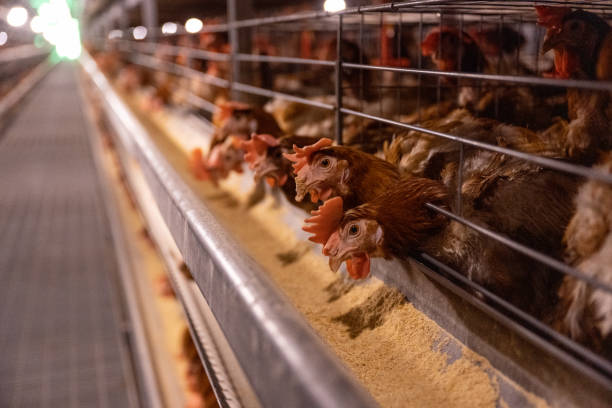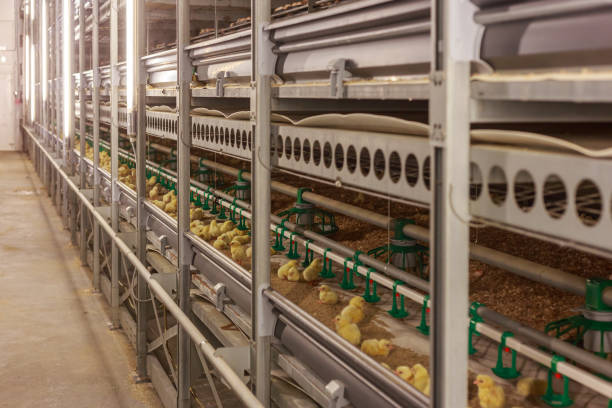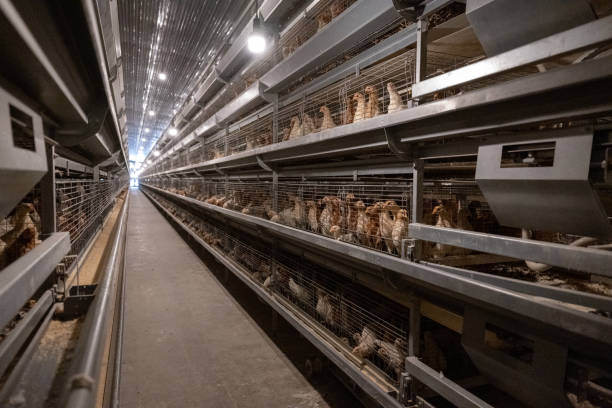
Durable & Affordable Poultry Farming Cages for Sale in Africa
Durable & Affordable Poultry Farming Cages for Sale in Africa
Africa’s poultry industry is experiencing substantial growth, presenting lucrative opportunities for farmers. However, success in this sector hinges on adopting efficient and cost-effective farming practices. One crucial aspect is selecting the right poultry farming cages. Investing in durable and affordable cages can significantly impact productivity, bird health, and overall profitability. This article delves into the importance of poultry cages in Africa, the different types available, factors to consider when purchasing, and where to find reliable suppliers.
The Importance of Poultry Cages in African Farming
Poultry cages are more than just enclosures; they are essential for optimizing poultry production in various ways:
Increased Space Efficiency: Cages enable farmers to house a larger number of birds in a smaller area compared to free-range systems. This is particularly important in regions where land is limited or expensive. By maximizing space utilization, farmers can scale their operations and increase output without requiring additional land investment.
Improved Disease Control: Cages provide a cleaner and more controlled environment for the birds. By keeping them off the ground, cages reduce their exposure to pathogens and parasites that can cause diseases. This leads to healthier birds, reduced mortality rates, and decreased reliance on antibiotics and other medications.

Enhanced Egg Collection: In egg-laying operations, cages simplify the egg collection process. Eggs roll down to designated collection areas, reducing breakage and contamination. This also saves time and labor, allowing farmers to focus on other important tasks.
Better Feed Management: With cages, farmers can easily monitor and control feed consumption for each bird. This ensures that all birds receive the appropriate amount of nutrients, leading to improved growth rates and egg production. It also minimizes feed wastage, reducing overall feed costs.
Reduced Labor Costs: Cages automate many aspects of poultry farming, such as feeding, watering, and egg collection. This reduces the amount of manual labor required, saving farmers time and money. Automated systems can further streamline operations and improve efficiency.

Predator Protection: Cages offer protection from predators such as foxes, snakes, and birds of prey. This is especially important in rural areas where these animals are prevalent. By keeping birds safe from predators, cages help minimize losses and ensure consistent production.
Types of Poultry Farming Cages Available
Several types of poultry farming cages are available, each suited to different needs and budgets:
Layer Cages: Designed specifically for egg-laying hens, layer cages are typically multi-tiered, providing individual compartments for each bird. These cages facilitate easy egg collection and monitoring of individual bird performance. They are available in various configurations, including A-frame and H-frame designs. Layer cages are effective at improving egg production efficiency and reducing egg breakage.
Broiler Cages: Used for raising meat chickens (broilers), broiler cages are designed to promote rapid growth and efficient feed conversion. These cages are generally larger than layer cages to accommodate the birds’ larger size. They often include features such as automatic watering and feeding systems to minimize labor requirements. Broiler cages contribute to consistent growth rates and improved meat quality.
Chick Cages (Brooder Cages): These smaller cages are used for raising chicks from hatchlings to young pullets. They provide a warm, safe environment with easy access to food and water. Brooder cages are essential for ensuring high chick survival rates and healthy development. They often incorporate heating elements or lamps to maintain optimal temperatures.
Battery Cages: Battery cages are a type of layer cage that house multiple hens in a small space. While they are highly efficient in terms of space utilization, they have come under scrutiny due to animal welfare concerns. Battery cages are typically used in large-scale commercial operations where maximizing egg production is the primary goal.
A-Frame Cages: A-frame cages consist of rows of cages arranged in an “A” shape. This design allows for easy access to food and water, and it also provides good ventilation. A-frame cages are a popular choice for small to medium-sized poultry farms. They are relatively easy to construct and maintain.
H-Frame Cages: H-frame cages are similar to A-frame cages, but they have a more robust structure and can accommodate more tiers. This design is ideal for maximizing space utilization in larger poultry houses. H-frame cages are often equipped with automated systems for feeding, watering, and egg collection.
Factors to Consider When Purchasing Poultry Farming Cages

Choosing the right poultry farming cages requires careful consideration of several factors:
Bird Type: Select cages specifically designed for the type of poultry you are raising (layers, broilers, or chicks). Each type of bird has different needs in terms of space, ventilation, and access to food and water. Using inappropriate cages can negatively impact bird health and productivity.
Cage Material: Opt for cages made from durable, corrosion-resistant materials such as galvanized steel. This will ensure that the cages can withstand the harsh conditions of the African climate and last for many years. Galvanized steel is also easy to clean and disinfect, which is essential for maintaining good hygiene.
Cage Size and Capacity: Choose cages that provide adequate space for each bird to move around comfortably. Overcrowding can lead to stress, disease, and reduced productivity. Consider the mature size of the birds when selecting cage sizes.
Ventilation: Ensure that the cages have adequate ventilation to prevent the buildup of harmful gases such as ammonia. Good ventilation is essential for maintaining air quality and preventing respiratory problems in birds. Properly designed cages should allow for natural airflow, or they may require supplementary ventilation systems.
Ease of Cleaning: Select cages that are easy to clean and disinfect. This will help prevent the spread of diseases and maintain a healthy environment for the birds. Look for cages with smooth surfaces and removable parts that can be easily washed.
Watering and Feeding Systems: Consider whether the cages come with automatic watering and feeding systems. These systems can save time and labor, and they ensure that birds always have access to fresh water and feed. Automatic systems also help minimize feed and water wastage.
Durability: Invest in cages that are built to last. Look for cages with strong frames and high-quality materials. Durable cages will provide a better return on investment in the long run.
Price: While affordability is important, don’t sacrifice quality for price. Cheap cages may not be durable or provide adequate space and ventilation, leading to problems down the road. Aim for a balance between price and quality.
Supplier Reputation: Purchase cages from a reputable supplier with a track record of providing high-quality products and excellent customer service. Check online reviews and ask for references before making a purchase.
Compliance with Animal Welfare Standards: Consider the ethical implications of your choice of cages. While battery cages are cost-effective, they raise animal welfare concerns. Explore alternative systems that provide more space and freedom for the birds, while still maintaining efficiency.
Finding Reliable Poultry Cage Suppliers in Africa
Several reputable poultry cage suppliers operate in Africa, offering a range of products and services. Here are some tips for finding reliable suppliers:
Online Research: Search online directories and marketplaces for poultry equipment suppliers in your region. Look for suppliers with positive reviews and a proven track record.
Trade Shows: Attend agricultural trade shows and exhibitions to meet suppliers and see their products firsthand. This is a great opportunity to compare different options and get expert advice.
Industry Associations: Contact poultry industry associations for recommendations on reputable suppliers. These associations often have lists of approved vendors.
Referrals: Ask other poultry farmers for referrals. They can provide valuable insights based on their own experiences.
Local Dealers: Check with local agricultural supply stores for information on cage suppliers. Local dealers can offer personalized service and support.
Specific Considerations for Durability in the African Climate
The African continent presents unique challenges for poultry equipment due to its diverse climates. Here are some specific factors to consider to ensure durability:
Rust and Corrosion Resistance: Choose cages with robust galvanization or powder coating to protect against rust and corrosion caused by high humidity and rainfall in many regions.
UV Resistance: If cages will be exposed to direct sunlight, ensure the materials are UV resistant to prevent degradation and cracking.
Structural Integrity: Opt for cages with reinforced frames and sturdy construction to withstand strong winds and potential impacts.
Temperature Tolerance: Ensure the cage materials can withstand extreme temperature fluctuations without warping or becoming brittle.
Cost-Effective Strategies for Purchasing Poultry Cages
While durability is essential, affordability is also a key consideration for many African farmers. Here are some strategies to maximize value for money:
Buy in Bulk: Purchasing cages in bulk often results in significant discounts.
Negotiate Prices: Don’t be afraid to negotiate prices with suppliers, especially for large orders.
Consider Used Cages: Used cages can be a cost-effective option, but be sure to inspect them thoroughly for damage or wear.
Explore Financing Options: Some suppliers offer financing options to help farmers spread out the cost of their purchases.
Compare Shipping Costs: Get quotes from multiple suppliers to compare shipping costs, as these can significantly impact the overall price.
Conclusion
Investing in durable and affordable poultry farming cages is a crucial step for success in Africa’s growing poultry industry. By carefully considering factors such as bird type, cage material, ventilation, and supplier reputation, farmers can choose cages that will improve productivity, bird health, and profitability. With the right selection of cages and a commitment to proper management practices, African poultry farmers can achieve sustainable growth and contribute to food security in the region. Remember to prioritize quality and durability to ensure a long-term return on your investment, and don’t hesitate to seek expert advice to make the best decision for your specific needs and circumstances. By strategically sourcing cages that are both durable and affordable, African poultry farmers can enhance their operations and contribute to the continued development of the industry.
